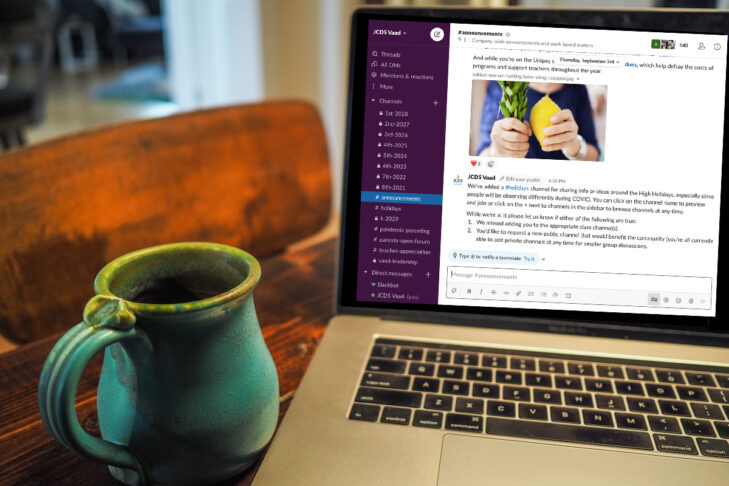There are a multitude of factors driving most parents’ decisions to send their children to Jewish day school. Here in Boston, where we have the luxury of deciding between a handful of day school options, parents who’ve made the decision to invest in a day school education must determine which school is the right fit for their family.
There is a litany of reasons that Boston-area Jewish parents choose to enroll their kids at JCDS, Boston’s Jewish Community Day School, including the dual-language curriculum, commitment to cultivating an environment of joyful Judaism and an intentionally pluralistic education, to name a few. Many parents have also specifically identified the warm embrace of a supportive and inclusive community as a driving force behind their decision to send their kids to JCDS.
At JCDS, the Va’ad Horim is our all-volunteer parent association with a mission of building community both inside and outside the school’s walls. The Va’ad is committed to supporting the faculty and staff to whom we entrust our children’s education, and bringing together and serving our intentionally pluralistic community of families. Although the school is deploying a hybrid educational model to start the year, parents aren’t able to congregate and interact in-person as they normally would, and families are fully remote at least a portion of the time.
Figuring out how to accomplish the Va’ad’s stated goals during a pandemic, therefore, left us with a bit of a conundrum. We gained some helpful knowledge from our experience navigating remote learning in the spring, but we needed to formalize what had been a makeshift approach to building community during a moment when parents craved connection and engagement more than ever.
When JCDS shifted to distance learning in March, many class parent cohorts created message groups on a variety of platforms. We learned both anecdotally and via responses to a parent survey that these groups proved invaluable in helping parents to stay connected and informed during an extremely challenging and uncertain few months. Parents found the groups useful for sharing resources, coordinating virtual playdates, receiving tech support and feeling connected to the JCDS community while being apart physically.
As this unique and unpredictable school year drew near, we sought ways to foster a robust and supportive online forum for our community. We’d already been tinkering with our communications strategy last year, pre-COVID-19, in response to parent feedback about overflowing email inboxes, implementing both a closed Facebook group and a one-way broadcast WhatsApp group with mixed results.
If ever there was a time to experiment with a radically different approach, it’s this year. Although people are often resistant to change and reluctant to download yet another app or learn a new platform, there’s growing frustration with the deluge of emails coming parents’ way. The “infobesity” problem parents endure has been exacerbated during the pandemic, with remote communications and innumerable Zoom invites overwhelming even the most organized of inboxes.
So, we forged ahead, hoping to build upon the experience described by parents who participated in message groups in the spring while expanding/improving upon it. One potential option was to provide guidance and instructions to each class cohort for how to create and utilize a group chat on WhatsApp, which had been the most popular option among those who had set up groups in the spring. Most of our parents are familiar with WhatsApp already and many utilize it regularly, especially our sizable contingent of Israeli parents. However, we quickly identified two issues with this approach: it precluded us from bringing the broader community together as one since it would be disparate groups by cohort, and we had heard from a growing number of parents last year that they were averse to using Facebook-owned platforms as a principled stance.
Instead, we zeroed in on Slack as the new communications platform for JCDS parents. Slack is familiar to many parents who already use or previously used the platform in their professional lives. The channel format is appealing because it allows us to streamline everyone onto one platform while enabling parents to interact both within class cohort-specific channels and with the broader parent community all in one place. We created private channels for each class cohort to communicate (share intel from kids, swap ideas, arrange playdates, get tech support, etc.). We also set up an announcement channel, restricted only to posts from Va’ad administrators, making it easy for parents to quickly and easily refer back to recent updates without having to sift through additional chatter.
Lastly, we set up two public channels open to all parents: “Pandemic Parenting,” which is for posting relevant articles, links to online resources and activities, and discussions about parenting during COVID-19; and an open forum channel for parents to post questions, solicit recommendations and share general information. Slack gives us the flexibility to adapt and expand as we go (i.e. adding private channels for any pods created by parents and/or public channels for discussion topics, such as social justice initiatives or baking, should we all find ourselves at home for long stretches and quarantine baking again).
In less than a week, we were able to successfully onboard over 60% of the parents at the school. Parents have already swapped first-day stories from their kids, crowdsourced new mask recommendations, welcomed new parents, shared tips and tricks, and mobilized a campaign to thank teachers at the end of the first week. While there’s no way to perfectly replicate the typical school year experience this year, we are confident parents will find the adoption of Slack to be a tremendously helpful way to stay connected and receive support from their peers as we navigate the challenging and unprecedented experience of parenting through a pandemic. At this moment in time, we feel the best way to foster engagement reflecting the vibrancy and connectedness of our day school community is to become “slackers,” and I’d urge you to consider doing the same.
A version of this piece previously appeared in eJewishPhilanthropy.com.
This post has been contributed by a third party. The opinions, facts and any media content are presented solely by the author, and JewishBoston assumes no responsibility for them. Want to add your voice to the conversation? Publish your own post here. MORE



